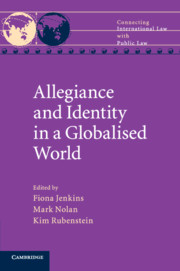
-
Select format
-
- Publisher:
- Cambridge University Press
- Publication date:
- November 2014
- November 2014
- ISBN:
- 9781139696654
- 9781107074330
- 9781107425378
- Dimensions:
- (228 x 152 mm)
- Weight & Pages:
- 1.23kg, 688 Pages
- Dimensions:
- (229 x 152 mm)
- Weight & Pages:
- 1.2kg, 695 Pages
You may already have access via personal or institutional login
Book description
Interrogating the concepts of allegiance and identity in a globalised world involves renewing our understanding of membership and participation within and beyond the nation-state. Allegiance can be used to define a singular national identity and common connection to a nation-state. In a global context, however, we need more dynamic conceptions to understand the importance of maintaining diversity and building allegiance with others outside borders. Understanding how allegiance and identity are being reconfigured today provides valuable insights into important contemporary debates around citizenship. This book reveals how public and international law understand allegiance and identity. Each involves viewing the nation-state as fundamental to concepts of allegiance and identity, but they also see the world slightly differently. With contributions from philosophers, political scientists and social psychologists, the result is a thorough appraisal of allegiance and identity in a range of socio-legal contexts.
Contents
Metrics
Altmetric attention score
Full text views
Full text views help Loading metrics...
Loading metrics...
* Views captured on Cambridge Core between #date#. This data will be updated every 24 hours.
Usage data cannot currently be displayed.
Accessibility standard: Unknown
Why this information is here
This section outlines the accessibility features of this content - including support for screen readers, full keyboard navigation and high-contrast display options. This may not be relevant for you.
Accessibility Information
Accessibility compliance for the PDF of this book is currently unknown and may be updated in the future.


